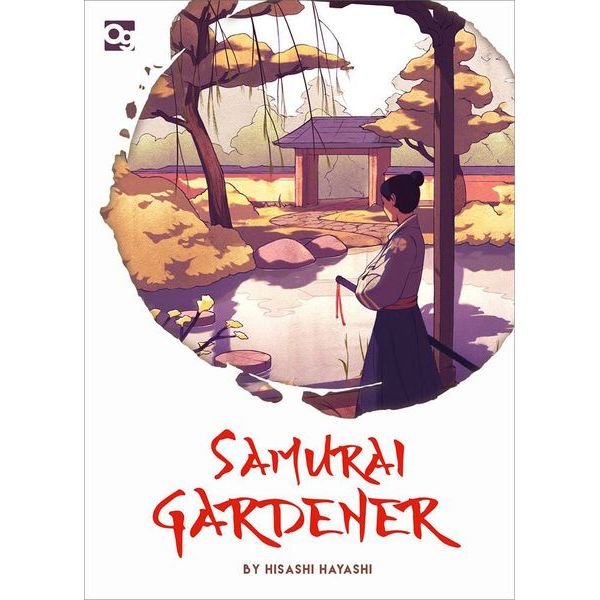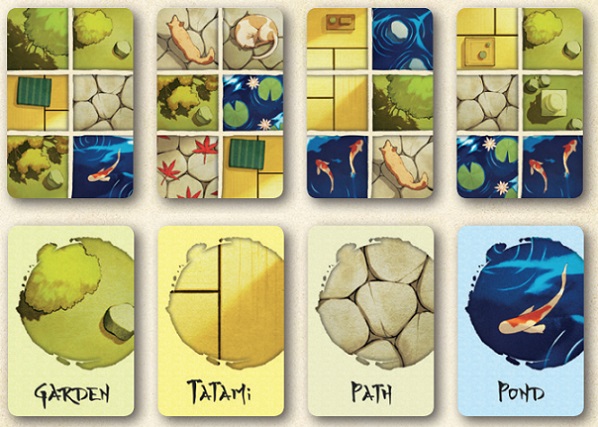Build a Well-Organized Garden in Card Laying Speed Game Samurai Gardener

Build a garden worthy of a samurai. With an eye towards layout and a little speed, your garden will put all the others to shame.
Samurai Gardener is a tile-laying card game that is super simple to learn but with a clever scoring mechanism that keeps the game interesting.
Gameplay
The game consists of a deck of sixty-four garden cards. Each garden card shows a two-by-three grid, with each square in the grid representing one of four types of garden features: pond, garden, path, and tatami. Each player has four feature cards, which correspond to each type of terrain type on the garden cards.
Each round, the starting player draws one garden card for each player and places them in the center of the table. Each player places their hands on their laps, then when everyone is ready, all players race to place their hand on a card. Whoever reaches a card first gets to add that card to their garden. Each player only claims one card each round.
When adding a card to your garden, it must be added vertically (though you can turn it upside down so that you have two possible ways to place it). It must also be either placed so that at least one of its squares is adjacent to or on top of a square on a card already in your garden (though you may not place it so that it covers all or part of a row or column of three or more matching squares).
After each player has added their card to their gardens, you check for scoring. You may only score a row if your relevant feature card is face up. When you make a row or column of three to five matching squares, you score one to four points and must flip over your matching feature card. If you score two or more rows/columns of different types of features in a single turn, you earn bonus points. Only when all four of your feature cards are flipped face-down, you flip them face-up again, allowing you to score that feature type again. On future rounds, if you extend a matching row or column that has previously been scored, and the relevant feature card is face up, you get to score that row again.
Once the round ends, the player to the right of the previous start player becomes the new start player, and another round begins. Play continues until someone's score moves above twenty-five points or the deck of garden cards runs out. The player with the most points wins.

Review
Samurai Gardener is quite light on the rules and really accessible and easy to teach. The feature cards introduce a layer of strategy, however, as you plan your garden and aim for different cards, without overcomplicating the game. The ability to score a row multiple times or earn combos for creating more than one row in a single turn, also adds a puzzle element to the game as you try to optimize your card placement.
The game also includes a card drafting variant in which the start player draws the cards each round, and then players take turns selecting one. This makes the game more flexible as not all players who enjoy the strategy and planning of tile laying will enjoy the speed element of the standard rules. The speed element is fun in its own right, however, and can lead to situations in which you have to adjust your plans and think outside the box when you end up with a card you did not expect.
Additionally, the game is fairly compact, which makes it great for travel or game nights away from home. The components are generally high quality, in keeping with Osprey's usual high standards, though the rulebook could be improved a little — for instance, one illustrative graphic was incorrect and contradicted what the text said.
Samurai Garden is an easy to learn, unassuming game, with a nice design and pleasant artwork and theme. It doesn't have a whole lot of "wow" factor, but it does have a unique scoring system and doesn't overstay its welcome. Check it out if you enjoy casual card or tile-laying games.
Pros: Portable, scoring system adds a puzzle element to the decision process, drafting variant for players who do not enjoy speed games
Cons: Error in rulebook, not a lot of "wow" factor
Disclosure: we received a complimentary review copy of this game.







